|
Pacing left and right in front of a flashing expanse of video screen, his ear fitted with a smart little microphone, Bilawal Bhutto-Zardari announced the birth of the Sindh Festival. This moment in mid-December of 2013 marks one of the most significant steps that this young politician, heir to one of the most significant and controversial political families in Pakistan's history, has yet taken towards creating a persona that is distinct from his predecessors. He and sister Bakhtawar had devised a TED-talk style multimedia lecture, demonstrating that they, like their generation in general, are fluent with technology. But the most memorable media projection appeared not on the big screen, but rather emblazoned on BBZ's person. In a winsome if sheepish gesture, he flung open what had seemed to be a black button-down shirt to reveal the Super-Sindh logo underneath. "Ladies and Gentlemen, I give you Sindh Fest, 2014," he grinned. And I challenge anyone to watch this announcement without smiling along with BBZ--no matter what you think of his family's politics. 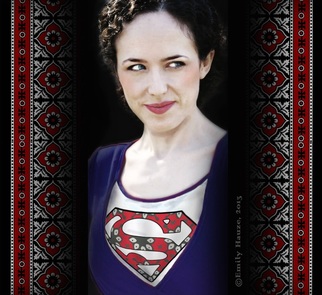 Super-Sindhiyani. Super-Sindhiyani. This was one bandwagon that I was very quick to hop on. That is surprising in itself, as I am normally loath to do anything "fashionable," and attention-grabbing efforts aimed at the masses usually leave me somewhere on the path between uninterested and revolted. Even here I reserve a pinch of suspicion and jadedness -- but not much. I'll admit being dazzled and surprised by Bilawal's presentation. And I'm aware that a move like this is intended to surprise and dazzle--and that winsome dazzling is often a mask to hide a multitude of faults. Thus I shall be cautious not to speak only through that sense of elation that I felt when a potential world leader stepped onto the stage and made a beacon of his Sindhi heritage to project to the world. Clearly, however, I am still elated and inspired by this beacon of Super-Sindh, and am eagerly projecting it myself as far as I possibly can. Perhaps some of this can be simply explained in that that my own quirky sensibilities seem to be very much in tune with those of the Bhutto-Zardari kids. Looking deeper than that, however, I see shining from within these ingenious media gimmicks a lot of thought, humanity, and hope. Above: Bilawal B-Z modeling his logos. Critics say he is trivializing Sindhi and Pakistani culture. I say he is simply inhabiting that culture in new way, with humor and zest. In my opinion, both are delightful. I approach this topic with a great deal of caution -- largely because I feel that this effort will have some significance for the future of my favorite country (Pakistan) and adoptive province (Sindh). On the surface, this is just a Festival, and an "apolitical" one as BBZ has tried to make clear. But nothing is that simple in Pakistan. And nothing is "apolitical." I am also in no great danger of being trapped in some sort of Bhutto Bubble, seeing a Pakistan only through the eyes of Benazir-worshippers or PPP cronies. As an outsider I am relatively free of influences from over here--Americans in general are tragically under-informed about Pakistan, and the only positive result of that is a relative lack of bias. I myself have been discovering Pakistan through many diverse lenses. My friends in Pakistan and in Sindh come from all parts of the political spectrum and class system, and all are vocal about their beliefs. And I am inherently (though respectfully) skeptical about every source of information I hear; I always bear in mind that even my most trusted friends and teachers speak from a perspective that might clash with another's genuine reality. So I do my best to listen to all and learn from all. My own views are crystalizing to some extent, but they will never be immutable. Even when I find something worth supporting--especially then--I feel it my duty to consider its negative impact very seriously. From its first announcement, the Sindh Festival and Bilawal himself have been subjected to criticism of all sorts -- sometimes deserved, sometimes exaggerated, sometimes farcical. The topic has more than once fueled lively debate on my Facebook timeline. In the midst of this I have found myself on numerous occasions functioning as a defender of both BBZ and his Festival -- which has actually taken me by surprise. For quite some time I had attempted to stay neutral when it came to Pakistani politics, hesitant to express a view on a country that is not my own and potentially ruffle feathers of people I would prefer not to provoke. But Bilawal's own fearlessness has given me some new courage in speaking out politically. I still seek to promote open and free dialogue among my friends of widely differing viewpoints -- but I am no longer hesitant to share my own. And I support the causes that Bilawal has begun to champion, especially the promotion of a unified Pakistani identity that is capable of overcoming extremism. That particular identity is very close to my heart. Because although my friends in Pakistan do come from many backgrounds socially and politically, there is a great spirit that unites them all -- an intellectual curiosity and depth of emotion that is present in all of them. (This includes that contingent of my friends who despise the very notion of Pakistan and wish to separate; although they will not be pleased with my characterization, they also share in this "Pakistani" spirit.) So: I personally have come to know this identity, in the course of friendships, debates, heart-to-heart talks, friendly and unfriendly encounters. I have had the privilege of meeting this Pakistan that is full of color, hope, and love. But the wider world has not had that same chance. A sound bite advertising the British-Asian comedy series "Citizen Khan" contained a one-liner that I loved. "Did you hear the news last night?" asks the character of Mr. Khan, an energetic Pakistani British immigrant, with a satisfied grin in his voice. "SEVEN TIMES they mentioned Pakistan, na?! ... Twice, in a good way!!" Pakistani people are used to bad news; the rest of the world is used to hearing bad news from Pakistan. But Bilawal Bhutto-Zardari is reminding us all -- Pakistan and the world -- that the news is NOT all bad. And the particular bit of 'good news' that BBZ has latched onto is very significant: Sindhi culture. This is not without controversy, as many of his critics feel that he is himself "not Sindhi enough," especially because he is not at home with the Sindhi language. But I implore such critics to take a step back and realize the value of a politician who launches his career from this particular platform. Like all politicians, Bilawal has to find a way to generate excitement and get noticed; he has to show that he has a vision of his country, and that he understands what matters to the nation at its core. By choosing Sindhi culture as a starting place, Bilawal shines a spotlight on the deepest treasure that Pakistan has to offer, which is the ancient cultural heritage of the Indus Valley. Although it could potentially be dismissed a 'feel-good' move for a politician to make, BBZ must have known also that his project would be a riven with difficulties in setting an appropriate tone. As always it is impossible to please everyone, but the greatest irony of the Sindh Festival has been the degree of scorn it has elicited from many Sindhi individuals (including a good number of my own respected friends--and I fully anticipate a resurgence of debate on this topic after they have read this post!). 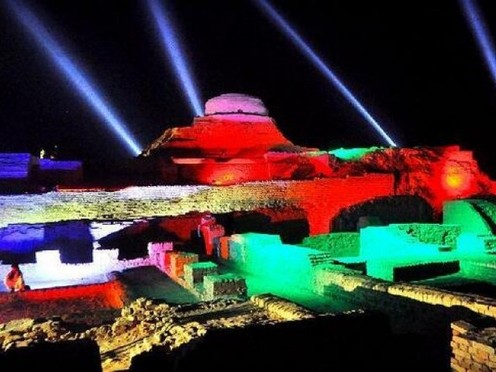 The ancient ruins of Mohenjo Daro illumined for the Festival. The ancient ruins of Mohenjo Daro illumined for the Festival. The opening ceremony especially, staged on the ancient ruins of Mohenjo Daro, provoked outrage on a number of counts before, during, and after it actually happened. A great deal of concern was raised when construction began on the stage site, with pictures spreading around Facebook of lights and poles and batteries being hauled around those dusty but hallowed walls. Much of this uproar served a very good purpose--to give a voice toward the protection of a great treasure of human history. A few disparate voices of reason, however, pointed out that many other ancient sites (the Acropolis, the Pyramids, etc) have been co-opted for reasons far less felicitous than this one, with crowds larger than this private event would have, without provoking the general horror of the concerned public. I would like to add to this picture that the Acropolis and the Pyramids are far more recognizable on a global scale than Mohenjo Daro is -- and that lighting it up in bright colors, though gaudy, is not a bad way to bring it some new attention. Meanwhile BBZ and his team responded in detail to preservationists' concerns, cooling most of the inflamed emotions against the use of the site. Potential scuffing to Mohenjo Daro was only one of the sources of Sindhi outrage over the festival, however. Another was the use of Urdu and English instead of Sindhi. Also the apparent lack of authentic Sindhi music and culture in the opening ceremony. And the apparent snubbing of some Sindhi musicians who attempted to attend the opening ceremony (though this point stands in some tension with the concern over the use of the site: because it was made clear that the guest list for the event was limited, ALL non-invitees were of course turned away--even if they happened to be authentic Sindhi musicians). Many Sindhi feelings were bruised to see that the Festival--particularly the opening ceremony--did not accurately portray THEIR Sindh. And I do have sympathy for that feeling. It is painful to see something that you love be watered down to make it palatable for a mass audience. Absolutely, a sense of irritation is inevitable. But we have to remember that the purpose of the Sindh Festival was not to put Sindhi culture on display for other Sindhis, who already know how to appreciate it. This had to be the lighter version, in order to make it possible for people outside of Sindh (not only in Pakistan but in the wider world) to begin to be able to appreciate what the culture has to offer. Sindhi people already know how wonderful Sindhi culture is, and they should continue to celebrate it in authentic, Sindhi ways. But those ways cannot easily project their message around the globe. Bilawal B-Z and his ingenious media team have begun packaging a palatable and lovable taste of Sindh in a way that can be exported. It is necessarily commercial. But although it cannot represent the true palette of colors and flavors that Sindh has to offer, it does not do any harm to Sindh. It does not take away any of that ancient treasure. Sindhis do not need to feel that their heritage has been assaulted by this incomplete representation. It must be remembered that, for example, many people outside of Pakistan have never seen an ajrak; and obviously they do not know the deep and spiritual significance of that cloth to Sindhi people. Is it not better for those ancient patterns to begin to enter global consciousness by this means than never to be seen at all? Is it not better for Mohenjo Daro to be seen around the world, lit up with high voltage colors, than never to be thought of at all? Among the many interesting debates I have led on this topic with my Facebook friends, some of the most productive were with my friend Bahar Ali Wassan, whose exuberant personality and joyous spirit I find to be quintessential examples of the true spirit of Sindh. At first he had been optimistic about the idea despite his disillusionment with the PPP, but all such optimism dissolved upon the opening ceremony, which left him feeling alienated and embittered due to what he felt was an insulting misrepresentation of his culture. Nonetheless he chose to keep an open mind, and he attended the Festival event held in his city of Hyderabad, a camel and horse show and a crafts fair. Thankfully he found much more of his OWN Sindh to be present at this event than had been in the opening Festival. He and a few of his Sindhi buddies attended with open hearts and had a great time, which they documented in a series of wonderful photographs (click here to see the whole album). I do not wish to imply that Bahar was completely won over to the point of now being a vocal supporter of the Festival. His review on the whole remains a mixed one. But he was able to recognize a lot of good in the effort, and his own positive spirit contributes to the positive vibe of the Festival on the whole. The event he attended allowed some of his own Sindhi passion to manifest in a way that could be shared with the wider world. Through him we can see that shining beacon of culture that is at the heart of this endeavor.
There are many more issues I could address here; this is fertile territory. The person of Bilawal himself deserves a lot more attention, and I suspect that I shall write about him again in the future. I want to make clear that I am not affiliated with him or with the PPP in any way, and am not an explicit supporter of the PPP or any other Pakistani party. I do harbor some reservations concerning dynastic politics--Bilawal is in essence a prince, and his experience of Pakistan is in many ways removed from that of the average Pakistani. I cannot claim to know if he will be a good leader for the party or for Sindh or for Pakistan. I am not good at making those kinds of predictions anyway. But I am excited about the potential of Bilawal B-Z's leadership. He has made a daring entrance onto the political scene, and his voice is clear, courageous, intelligent, ironic, and unabashedly quirky. I am not put off by his inherited charisma. Charisma is a form of capital like any other -- and this is a necessary tool for any leader hoping to lead a country as complex and troubled as Pakistan. He still has to prove himself in many ways. The Sindh Festival is the first chapter of a biography which will no doubt be a page-turner. I hope that subsequent chapters will contain much more good news for Sindh and for Pakistan.
1 Comment
|
Image at top left is a digital
portrait by Pakistani artist Imran Zaib, based on one of my own photographic self-portraits in Thari dress. AuthorCurious mind. Archives
September 2020
Categories |
emily s. hauze
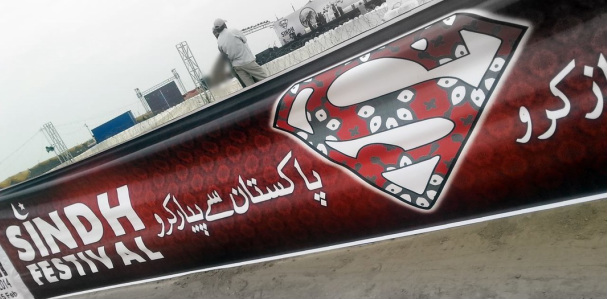
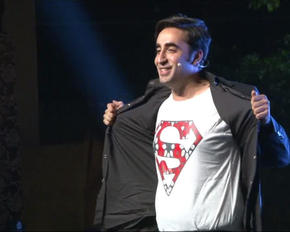
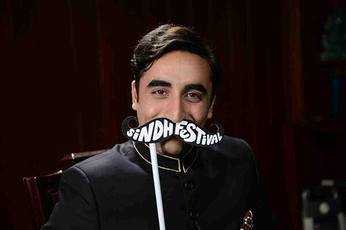
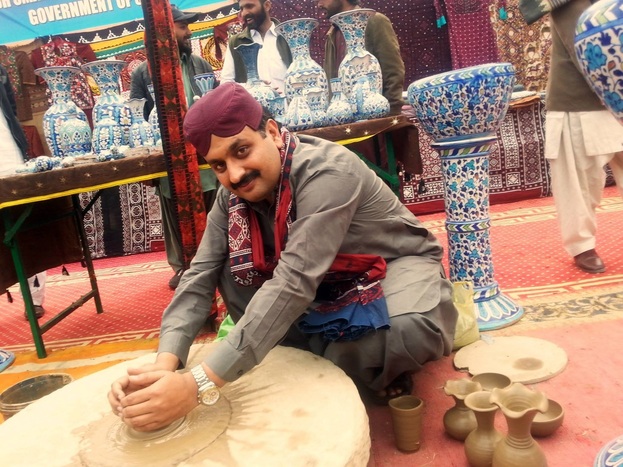
 RSS Feed
RSS Feed
